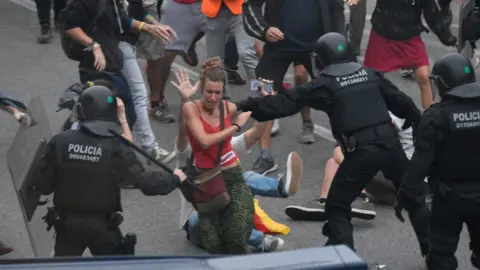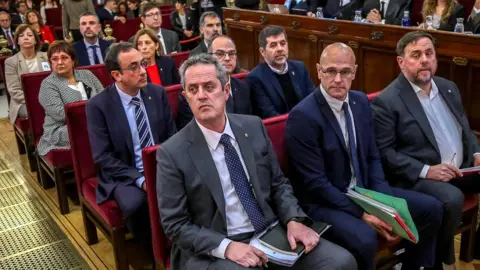Violent clashes erupt as Spanish court jails Catalonia leaders
Protests have erupted in Barcelona after Spain's Supreme Court sentenced nine Catalan separatist leaders to between nine and 13 years in prison.
The separatists were convicted of sedition over their role in an illegal independence referendum in 2017.
Another three were found guilty of disobedience and fined, but not jailed. All 12 defendants denied the charges.
Large crowds of pro-independence protesters clashed with police at Barcelona's international airport.
Footage showed people attempting to break through a police line blocking one area of the building, while in another, officers hit protesters with batons and attempted to disperse the crowds with gas.
A total of 108 flights were cancelled on Monday, the Spanish airport authority Aena said.
 AFP
AFPThousands of Catalan independence supporters also marched in the city centre, blocking some streets and access to metro stations.
After the ruling, a new arrest warrant was issued for former Catalan President Carles Puigdemont, who is living abroad. Mr Puigdemont told a press conference that Catalonians were victims of a "strategy of repression and revenge".
What happened at the trial?
Some of the 12 leaders sentenced on Monday had held prominent positions in Catalonia's government and parliament, while others were influential activists and cultural advocates.
During four months of hearings, they told the court in Madrid that they were victims of an injustice in a trial built on "false" charges.
The longest sentence of 13 years was handed to Oriol Junqueras, the former vice-president of Catalonia and the highest-ranking pro-independence leader on trial, for sedition and misuse of public funds.
The prosecution had sought up to 25 years in prison for Junqueras.
 Getty Images
Getty ImagesThe new European and international arrest warrant against Mr Puigdemont was issued on grounds of sedition and misuse of public funds.
He fled to Belgium in October 2017 to avoid prosecution in Spain following the failed independence bid.
What has the reaction been?
Junqueras accused Spain of jailing people for their political ideals and pledged that the separatists would return even stronger.
But Spain's Prime Minister Pedro Sánchez insisted the leaders had been jailed for criminal conduct.
Mr Puigdemont said the sentences handed to separatist leaders of "100 years in total" were "an atrocity".
"Now more than ever... it is time to react like never before," he wrote on Twitter, adding: "For the future of our sons and daughters. For democracy. For Europe. For Catalonia."
Those on the street communicated feelings of anger and powerlessness.
"Today is going to be historic, you can feel it in the atmosphere. Serious things are happening, we can't stay home," Oscar Quiles, a 47-year-old real estate entrepreneur told AFP news agency.
"The indignation is just too much and affects too many people," another protester said. "What they don't realise is that we are very angry and we will not stop."

 Getty Images
Getty ImagesAnger spills on to the streets of Barcelona
By Damian Grammaticas, Europe correspondent
The sentences handed down have shocked many across Catalonia. Shortly after they were announced small knots of students - banners and flags held aloft - began marching in Barcelona, heading for the squares where they gathered during the independence bid two years ago.
Anger swirled in the air along with sound of whistles and loudhailers. "This is not justice, this is revenge" they shouted. Madrid deployed police reinforcements in the region and sections of the city's streets were cordoned off to traffic.
The prison terms given to the Catalan independence leaders were not the 25 years prosecutors had sought in some cases, but they are nevertheless seen as an outrage by many Catalans.

The Catalan National Assembly called for "mobilisations around the globe" - including in the UK, France and Germany - in a tweet using the hashtag #StandUpForCatalonia.
Others used the hashtag to post footage of students marching in protest against the sentences moments after they were announced on Monday.
Allow X content?

Meanwhile, both FC Barcelona and the Catalan football federation condemned the prison sentences and called for "dialogue and negotiation" to resolve the situation.
The federation added that it had suspended all football matches in the region to show solidarity with the leaders and their families.
Over the weekend, hundreds of protesters rallied in the city.
In 2017, police and protesters clashed in the streets when Catalonia's pro-independence leaders went ahead with the referendum, which had been ruled illegal by Spain's constitutional court.
Who else has been sentenced?
Other separatist leaders to receive prison sentences for sedition were:
- Dolors Bassa, former Catalan labour minister (12 years)
- Jordi Turull, former Catalan government spokesman (12 years)
- Raül Romeva, former Catalan external relations minister (12 years)
- Carme Forcadell, ex-speaker of the Catalan parliament (11.5 years)
- Joaquim Forn, former Catalan interior minister (10.5 years)
- Josep Rull, former Catalan territorial minister (10.5 years)
- Jordi Sànchez, activist and ex-president of the Catalan National Assembly (9 years)
- Jordi Cuixart, president of Catalan language and culture organisation Òmnium Cultural (9 years)
The nine leaders, who had already spent months in pre-trial detention, were acquitted of a more serious charge of rebellion.
The remaining three defendants were earlier released on bail.
During their closing arguments in June, defence lawyers told the court their clients denied the charges of rebellion and sedition, but admitted to the lesser charge of disobedience which could have seen them be banned from public office but avoid prison.
How did they end up in court?
Prosecutors argued that the unilateral declaration of independence was an attack on the Spanish state and accused some of those involved of a serious act of rebellion.
They also said that separatist leaders had misused public funds while organising the 2017 referendum.
Prosecutors argued the leaders had carried out a "perfectly planned strategy... to break the constitutional order and obtain the independence of Catalonia" illegally.
Forcadell, the former parliament speaker who read out the independence result on 27 October 2017, was also accused of allowing parliamentary debates on independence despite warnings from Spain's Constitutional Court.
Some of the leaders, speaking to the BBC ahead of the trial, said the proceedings were political in nature. Any violence, they said, was on the part of police and committed against voters in a crackdown which made headlines around the world.
Three weeks after the banned 2017 vote, the Catalan parliament declared an independent republic.
Madrid stepped in to impose its rule on the region, and several Catalan leaders fled or were arrested.
What is behind the Catalonia controversy?
Catalan nationalists have long complained that their region, which has a distinct history dating back almost 1,000 years, sends too much money to poorer parts of Spain, as taxes are controlled by Madrid.
The wealthy region is home to about 7.5 million people, with their own language, parliament, flag and anthem.
In September, a march in Barcelona in support of Catalonia's independence from Spain drew crowds of about 600,000 people - one of the lowest turnouts in the eight-year history of the annual rally.
